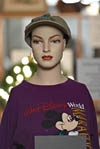
f/1.4

f/2

f/2.8

f/4

f/5.6

f/8

f/1.8

f/2

f/2.8

f/4

f/5.6

f/8

f/2.8

f/4

f/5.6

f/8

f/2.8

f/4

f/5.6

f/8

f/2.8

f/4

f/5.6

f/8

f/2.8

f/4

f/5.6

f/8

f/2.8

f/4

f/5.6

f/8

f/4.5

f/5.6

f/8
Nikon D80 Portrait Lens Tests
Portrait Lens Comparison
These tests compare eye sharpness, out of focus background blur (bokeh) and out of focus diaphram light patterns among several Nikon lenses with a Nikon D80 camera. To review lens characteristics, look at the f/8 images that show the maximum mannequin and background detail. Then look at images taken at wider-aperture to compare lens sharpness and bokeh as aperture is opened to f/1.4. Canon lens tests are included below as reference.
I use Nikon cameras for scientific medical photography at work and upgraded my D100 with a D80. I normally shoot portraits with full-frame Canon gear (e.g., EOS-1Ds). However, I occasionally use the Nikon for impromtu candid style portraits at work and tested some readily available lenses.
All images are full frame from RAW files converted with Phase One Capture One 1 Pro v 3.7.6 with slight unsharp mask applied in Photoshop. Cameras/lens combinations were all shot on tripod with aperture priority with custom white balance off the grey card. Lighting is from a bounced tungsten modeling light off a angled wall behind camera, and a modeling light is on the background. The mannequin's right eye is the focus point.
Conclusions: Draw your own conclusions depending on your
shooting preferences. My summary of lens performance is at the bottom of
the page.
Comparison of Nikkor 85mm f/1.4 on 1.5x format D80 and Canon EF 85mm
f/1.2L on Full-Frame EOS-1Ds Mark II
The full-frame Canon camera
with the EF 85mm f/1.2L lens gives the most diffuse out of focus
background blur (best bokeh). The Canon full frame camera allows a shorter
working distance than the 85mm Nikon lens. Standard setting camera color
and tone is more vivid and contrasty out of the consumer grade Nikon D80
than the Canon EOS-1Ds mk II. The greater working distance of the Nikkor
85mm lens on a 1.5x format camera allows greater use of the lens at f/1.4
for portraits than the Canon 85 L. At f/1.4 with the Nikkor, all of the
face shot parallel to the sensor plane is in focus (assuming a short
nose). With the full-frame Canon camera, the 85L shot at a closer working
distance puts both eyes in focus at f/1.4, but the nose and lips are
outside the plane of focus.
Comparison of Nikkor 50mm f/1.8 on 1.5x format D80 and Canon EF 50mm
f/1.8 on 1.6x format 20D
The more expensive and better built
(metal mount) Nikon 50mm f/1.8 produces more diffuse background blur than
the Canon 50mm f/1.8. Note the 7-blade diaphragm out of focus light
pattern with the Nikkor lens at f/2.8 and f/4 and the 5-blade out of focus
light diaphragm pattern with the Canon lens. Both lenses are good
light-weight, compact portrait performers at f/2.8.
| f/1.8 | f/2 | f/2.8 | f/4 or f/4.5 | f/5.6 | f/8 | |
| Nikon D80 and 50mm f/1.8 AF |
 f/1.8 |
 f/2 |
 f/2.8 |
 f/4 |
 f/5.6 |
 f/8 |
| Canon 20D and EF 50mm f/1.8 |
 f/1.8 |
 f/2 |
 f/2.8 |
 f/4 |
 f/5.6 |
 f/8 |
Summary of Findings with Nikkor Portrait Lenses Tested
Index
posted
5 November 2006; revised 6 November 2006.